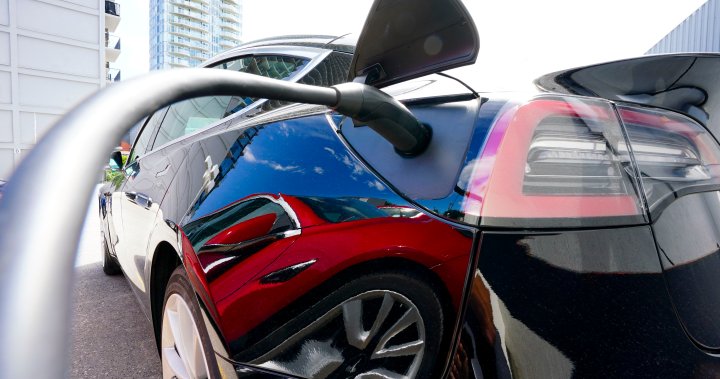Electric vehicle (EV) owners in Canada may start to see their insurance rates jolt in the coming years, a new report indicates.
The study by credit rating agency Morningstar DBRS suggests insurers in the U.K., Europe and parts of the U.S., where EV uptake is higher than in Canada, are starting to experience the impacts the EV transition is having on claims costs.
“The rates (in Canada) haven’t changed significantly when compared to regular internal combustion engine cars. It’s still the same, and the reason is because there’s a low uptake of electric cars in Canada compared to Europe, the U.S. and other jurisdictions,” said the report’s co-author, Victor Adesanya, vice president of insurance credit ratings at Morningstar DBRS.
“Right now, it’s not an issue, because they have fewer cars on the road, but as time goes on … then it could be an issue.”
The report notes that Canada’s EV transition has not been as rapid as compared with the U.K. and Europe, where sales have grown exponentially since 2019, boosted by government incentives for buyers and material investment in charging infrastructure, the report indicates.
Ottawa has mandated that by 2035, all new vehicles sold in Canada must be emissions-free. In two years, 20 per cent of all cars sold must be zero emissions. It has laid out a road map of how to get there, but critics have said it’s unrealistic.
According to Statistics Canada’s most recent data, EVs accounted for three per cent of light-duty vehicle registrations in 2022, up from 2.3 per cent in 2021. The total number of road motor vehicles registered in Canada was 26.3 million in 2022, and light-duty vehicles accounted for 91.7 per cent of that figure.
Since EVs are relatively new to the market, insurers here do not have enough historical claims data to accurately estimate lifecycle durability, maintenance and repair costs, the Morningstar report said.
However, it states several reasons why Canadian EV owners can expect higher insurance costs in the future.
Get the latest Money 123 news.
Sent to your email, every week.
For one, “they cost more, so simply because they cost more, they’ll be more expensive to insure,” Adesanya said.
“The higher the value, the higher the cost is to replace if it is damaged or stolen. That’s the risk that the insurance company will factor into their pricing.”
EVs have fewer serviceable parts compared with internal combustion engine (ICE) vehicles, which suggests that maintenance costs should be lower, the report says.
However, the report indicates other factors, like the cost to replace battery packs, the availability of replacement parts and the scarcity of skilled technicians, will affect the price of repairs and ultimately insurance rates in the short run.
“Insurance is a one-year contract,” Adesanya said.
“So, your rates can change from year to year.”
To back up its findings, the report cites a few instances where insurance companies have had to deal with EV claims.
An Oct. 28, 2023 Financial Times article stated that British auto insurers increased their rates considerably over the year, with one carrier suspending insurance coverage for EVs altogether to enable it to re-evaluate the cost of repairs.
Furthermore, recent media reports from British Columbia described how the main provincial auto insurer wrote off an entire EV because the cost to replace the battery would be the same as buying a new car of the same brand and make.
Similarly, U.K. media have reported that some insurers have opted to write off EVs instead of repairing damaged battery packs after the vehicles had been involved in minor collisions.
The report added that over time, more auto insurers will be faced with the same challenge, which will likely be reflected in higher auto insurance rates as more EVs hit the road.
“Insurance is an experience-based business,” Adesanya said.
“Every year there’s opportunity for the company to review the experience of that particular product and see if the claims costs are rising.”
However, the silver lining for Canadian EV owners may be the fact the country’s insurance sector is highly regulated.
Provincial governments are responsible for the regulation of auto insurance policies, including the monitoring of claims handling and dispute resolution. Provincial regulators in Canada also review and approve requests made by insurers to increase rates before they can be implemented, Adesanya said.
He added it’s unlikely Canadian EV owners will see a sudden shock in rates, but rather a gradual increase. He said it should take roughly five to 10 years before insurance companies have enough data for rates to stabilize.
“Insurance is statistics.… As they get more information, they’ll keep on tweaking the pricing models,” Adesanya said.
“By the time we get to 2035, they should have material data that the pricing begins to stabilize.”
© 2024 Global News, a division of Corus Entertainment Inc.




